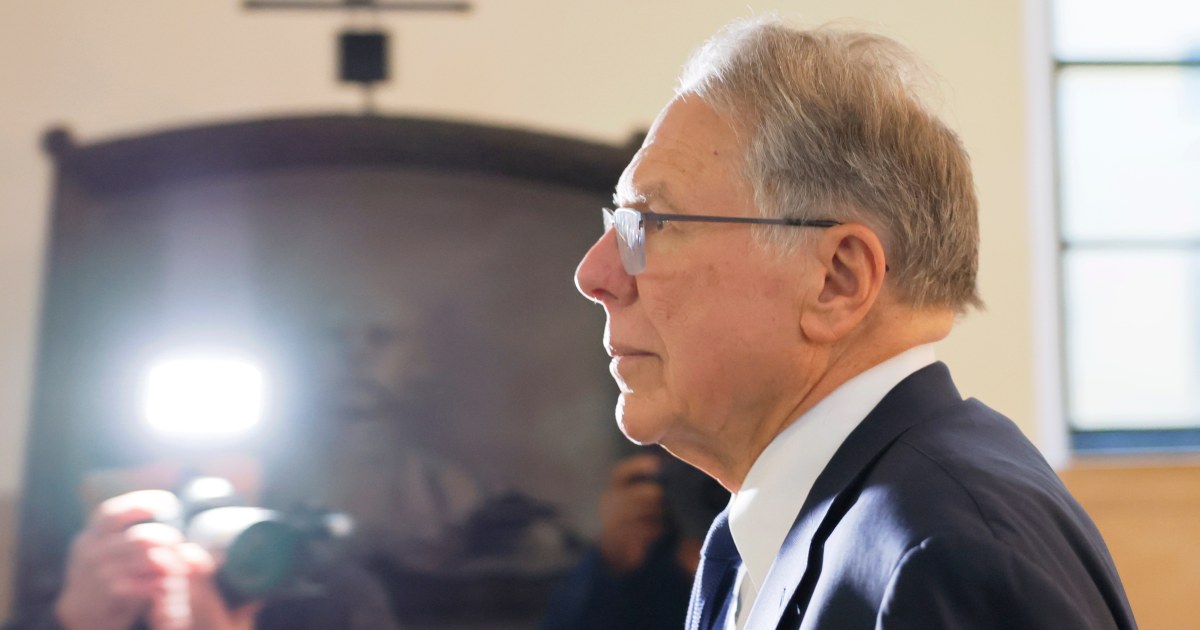The New York Attorney General’s office compared Wayne LaPierre and other current and former National Rifle Association executives to children caught stealing from a cookie jar Thursday during closing arguments in its civil corruption trial.
The defendants denied, deflected and minimized their alleged misuse of millions of dollars in NRA funds, the way a guilty child does, Monica Connell, an attorney with the New York State Attorney General’s office, told jurors.
“They’re going to try to get you to think about anything except what happened to those cookies,” she said. “They’re going to blame anyone else but themselves.”
In her final remarks, Connell told jurors that the issue at hand, corruption, was much more serious than her cookie analogy. She urged the jury to hold the defendants accountable, even if their attorneys outlined steps they may have taken to address or correct violations.
“Saying you’re sorry now,” she said, “doesn’t mean you didn’t take the cookies.”
Earlier Thursday, attorneys for the NRA, LaPierre and two other defendants urged jurors to scrutinize thecase against them, claiming the trial was brought on by a campaign pledge to destroy the gun rights group.
During his closing arguments, LaPierre’s attorney, P. Kent Correll, said New York Attorney General Letitia James set out years ago to dissolve the NRA and sued LaPierre as part of that goal.
Correll mentioned remarks James made years ago, when she was a candidate for attorney general, suggesting the NRA was akin to a “terrorist organization” and saying she would open an investigation if she was elected.
“She wanted to decapitate the organization, and that was for political reasons,” Correll said.
James filedher lawsuit in 2020, alleging that LaPierre, 74, drew millions of dollars away from the NRA on luxuries for himself, while other executives flouted nonprofit laws and internal policies to enrich themselves.
Calling the case perhaps the “most important” currently unfolding in the nation, Correll called out James’ absence in the courtroom on Thursday and throughout the six-week trial.
“Where is Letitia James? I don’t see her,” he told jurors. “If this case was so important to her, she would be here.”
The attorney general’s office declined to comment.
James’ attorneys have spent the last few weeks in a New York City courtroom painting the NRA as “Wayne’s World,” which they said was full of free private jets, expensive meals, travel consultants, private security and trips to the Bahamas for him and his family.
On Thursday, Connell reminded the jury that LaPierre spent more than $500,000 of the NRA’s assets to fly himself and his family members to the Bahamas. The NRA incurred over $1 million in expenses for private flights on which LaPierre was not a passenger, she said.
“This went on year after year after year,” she said.
The other defendants are the NRA itself; John Frazer, its corporate secretary and general counsel; and Wilson “Woody” Phillips, its former treasurer and chief financial officer. They are accused of breaching their fiduciary duties and failing to take action against LaPierre, ultimately helping their then-boss maintain his power.
The NRA has operated as a nonprofit charitable corporation in New York since 1871. Its assets are required by law to be used in a way that serves the interests of its membership and advances its charitable mission.
Attorneys for the NRA have said former rogue employees had stolen from the organization without the group’s knowledge but that the NRA was not willfully blind to violations.
NRA attorney Sarah Rogers told jurors the case was not about Second Amendment rights, but that it was “very much a case about self-defense” against the government.
“If this is a case about corruption, it wasn’t corruption by the NRA,” Rogers said.
If the jury finds the individual defendants liable, they will recommend the amount of money that each defendant would have to repay the NRA.
In a potential second phase of the trial, State Supreme Court Judge Joel Cohen, who has the final say over monetary damages and remedies, could determine whether Frazer should be removed from his post.
Frazer, the only individual defendant who still works for the NRA, is accused of submitting false statements. He risks losing a job he has held for about 30 years and “every penny that he’s ever made at the NRA,” his attorney, William Fleming, said.
“I ask you to send him home with his good name and reputation,” Fleming said Thursday. “Do not send him home in disgrace because he doesn’t deserve it.”
Phillips’ attorney, Seth Farber, said his client was “not perfect” and made mistakes, but that there is a “huge difference between violating an NRA policy and violating a law.”
None of the defendants has been criminally charged as part of James’ lawsuit.
The judge could also decide later whether any of the individual defendants should be permanently barred from serving on the board of any charity in New York and whether an independent monitor should oversee the NRA’s finances.
James had initially set out to dissolve the NRA as part of her suit. However, Cohen dismissed that effort in 2022, saying her complaint “does not allege the type of public harm that is the legal linchpin for imposing the ‘corporate death penalty.’”
The jury is slated to begin deliberations Friday.

